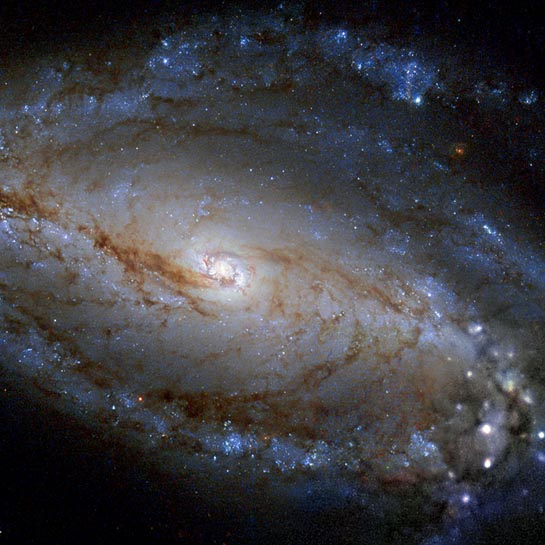
Spiral Galaxy
RA 1h 34m 17.58s Dec -29° 24' 57.03"
Sculptor
65 million light years
2.13 x 2.01 arcminutes
North is 52.2° right of vertical
ESA/Hubble & NASA & S. Smartt (Queen's University Belfast), Ack: Robert Gendler
September 28, 2015
2003 full view: G0338
ABOUT THIS IMAGE:
Ribbons of dust festoon the galaxy NGC 613 in this new image from the NASA/ESA Hubble Space Telescope. NGC 613 is classified as a barred spiral galaxy for the bar-shaped band of stars and dust crossing its intensely glowing center.
About two thirds of spiral galaxies show a characteristic bar shape like NGC 613 - our own galaxy appears to have one of these bars through its midline as well.
NGC 613 lies 65 million light-years away in the constellation of Sculptor (The Sculptor). It was first noted by the English astronomer William Herschel in 1798 and later by John Louis Emil Dreyer, a Danish-Irish astronomer, who recorded the object in his 1888 New General Catalogue of Nebulae and Clusters of Stars - hence the letters "NGC".
NGC 613's core looks
bright and uniformly white in this image as a result of the combined light
shining from the high concentration of stars packed into the core, but
lurking at the center of this brilliance lies a dark secret. As with nearly
all spiral galaxies, a monstrous black hole resides at the heart of NGC
613. Its mass is estimated at about ten times that of the Milky Way's
supermassive black hole and it is consuming stars, gas and dust. As this
matter descends into the black hole's maw it radiates away energy and
spews out radio waves. However, when looking at the galaxy in the optical
and infrared wavelengths used to take this image, there is no trace of
the dark heart.